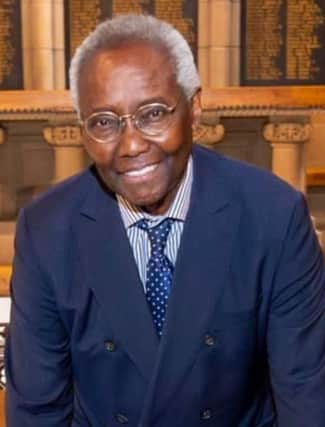Edinburgh appoints Scotland's first black professor to lead review of statues and street names linked to slavery


The city council announced Sir Geoff, who is a leading human rights activist, would chair the Edinburgh Slavery and Colonialism Legacy Review Group, which is due to meet for the first time before the end of the year.
The move comes in the wake of protests over the Melville monument in St Andrew Square, which commemorates 18th century Home Secretary Henry Dundas, 1st Viscount Melville, who is seen as responsible for delaying the abolition of slavery in Britain by 15 years from 1772 to 1807.
Advertisement
Hide AdAdvertisement
Hide AdThe group’s remit will cover any features within the council boundary which commemorate those with close links to slavery and colonialism, including, but not limited to, public statues and monuments, street or building names.
The group will be asked to make recommendations for a programme of actions and activities to rectify the glorification of slavery and colonialism which these commemorations represent to many people. It will consider all options, including the removal of statues.
Sir Geoff, who is professor emeritus in the school of life sciences at Heriot-Watt University and honorary president of Edinburgh and Lothians Regional Equality Council, said: “I regard this appointment as a great honour and duty to work with the group and the community to ensure the council’s aim of fairness and justice to all is realised."
He will now recruit the other members of the group, with the aim of bringing together people from a range of backgrounds and expertise including community leaders and figures from the cultural and arts world, as well as academic representatives. There is an expected emphasis on having a very strong BAME representation.
Advertisement
Hide AdAdvertisement
Hide AdCouncil leader Adam McVey said: “We have a responsibility to face up to our city’s past, the good and the bad. While this review is about the story of our city, it’s not about statues of people long gone. It’s about people who live here now and their experience.
" The Black Lives Matter movement shone a bright light on structural exclusions faced by people in all areas of life. We are committed to investigating, with communities and partners, where any such exclusions might exist in Edinburgh. Through this review group we hope to build an improved shared understanding of our Capital’s history by reviewing the origins of our public statues, monuments and street names and their context with events and meanings and making sure we share the true stories with future generations. I very much look forward to hearing the review group’s findings.”
And depute council leader Cammy Day said: “This group will make sure we take action where we can in response to lessons learned from the Black Lives Matter movement. It’s important we listen to and act upon the views of the BAME community.
“We have a duty to work to understand what the perception is now and what could make it better. We want the group to consider all options for rectifying the glorification of slavery and colonialism in our streets and elsewhere and for supporting diversity in our city.”
A message from the Editor:
Thank you for reading this article. We're more reliant on your support than ever as the shift in consumer habits brought about by coronavirus impacts our advertisers.
If you haven't already, please consider supporting our trusted, fact-checked journalism by taking out a digital subscription.
Comment Guidelines
National World encourages reader discussion on our stories. User feedback, insights and back-and-forth exchanges add a rich layer of context to reporting. Please review our Community Guidelines before commenting.